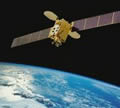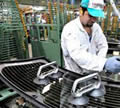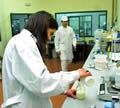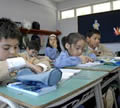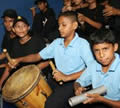- Reunión inter-regional de expertos sobre la medición de la cooperación Sur-Sur
- La SEGIB lanza newsletter con nuevas historias sobre cooperación sur-sur y triangular
- ¿Cuál es el valor de las universidades públicas hoy en Argentina?
- Una cumbre empresarial entre Corea del Sur y América Latina tendrá lugar esta semana
- Cuba en la Cooperación Sur-Sur: el camino para la integración
- Good Practices in South-South and Triangular Cooperation for Sustainable Development – Volume 4
- Global South-South Development Expo 2022 Concept Note
- Cooperación Sur-Sur en América Latina en tiempos de pandemia
- Valoración de la cooperación Sur-Sur en seis países seleccionados de América Latina y el Caribe: desafíos compartidos en la implementación de la Agenda 2030 para el Desarrollo Sostenible
- Desarrollo en transición: propuesta de concepto y medición para una cooperación renovada en América Latina y el Caribe
Yesterday, at the headquarters of the Economic Commission for Latin America and the Caribbean (ECLAC), the region's integration and support agencies began a two-day meeting to seek ways of strengthening mutual cooperation.
Taken from ECLAC Website
Santiago, November 9- Yesterday, at the headquarters of the Economic Commission for Latin America and the Caribbean (ECLAC), the region's integration and support agencies began a two-day meeting to seek ways of strengthening mutual cooperation.
The 2nd Meeting of Regional and Subregional Integration Mechanisms and Bodies, which will be held since until today in Santiago, Chile, brings together senior authorities and representatives from institutions, who will follow-up on the mandate issued by 33 Latin American Presidents that make up the Community of Latin American and Caribbean States (CELAC) at the first meeting held in Montevideo, Uruguay, in August.
The meeting will be attended by delegates from the Latin American Integration Association (ALADI), Bolivarian Alliance for the Peoples of Our America (ALBA), Association of Caribbean States (ACS), Pacific Alliance, CAF-Latin American Development Bank, Andean Community (CAN), Caribbean Community (CARICOM), ECLAC, Latin American Faculty of Social Sciences (FLACSO), Southern Common Market (MERCOSUR), Organisation of Eastern Caribbean States (OECS), Latin American Energy Organization (OLADE), Amazon Cooperation Treaty Organization (ACTO), Central American Integration System (SICA), Secretariat for Central American Economic Integration (SIECA),Latin American and the Caribbean Economic System (SELA)and the Union of South American Nations (UNASUR).
During the meeting, the representatives from regional and subregional bodies will discuss the proposals and suggestions from the first meeting held in Uruguay, which defined the strategic imperative of further uniting Latin America and the Caribbean, and which agreed on joint efforts to build regional citizenship, extend regional trade, physical/energy and production integration, protection of cultural heritage, food security, natural disaster management, infrastructure modernization and successful experiences of social inclusion in the region.
Participants will also agree on ways to deepen coordination among presidencies and secretariats, so as to enhance effectiveness and avoid any duplication of efforts.
The conclusions of this 2nd meeting are expected to be submitted as proposals to the CELAC Summit of Heads of State and Government, which will be held in Santiago, Chile, on 27 and 28 January 2013.
The meeting was opened by Fernando Schmidt, Deputy Foreign Affairs Minister of Chile, which holds the pro-tempore presidency of CELAC. He highlighted the fact that "the moment has come to give renewed drive to the integration process, by reaffirming our common purpose of integration, cooperation and unity for the region".
Mr. Schmidt added that "The regional integration process faces huge challenges and is rooted in the hopes of our peoples".
Carlos Álvarez, Secretary-General of ALADI, emphasized that the responsibility of integration bodies is becoming increasingly important in the context of the current difficulties and challenges facing the region in this domain.
He added that "The complementarity and convergence dynamic will help to strengthen each of the integration bodies, and this will contribute to the growth of CELAC. [...] We must find common denominators and spaces to boost what we do as a contribution to the building of CELAC".
On behalf of the Executive Secretary of ECLAC, Alicia Bárcena, participants were welcomed by the Officer-in-charge of the Secretary of the Commission, Luis Fidel Yáñez. He stated that this meeting would enable solid progress to be made towards the growth of integration in Latin America and the Caribbean.
Mr. Yáñez also highlighted the contributions of this United Nations commission to the fulfilment of the CELAC mandate, particularly the accumulated experience of its analysis of history, medium- and long-term social and economic trends and reflections on improving public policy actions in the region.
He declared that "The project of Latin American integration is in the DNA of ECLAC, and requires a major commitment from all of us. It is therefore vital to overcome fragmentation and the duplication of efforts, act flexibly and pragmatically and put country needs and direction before any specific agendas".











